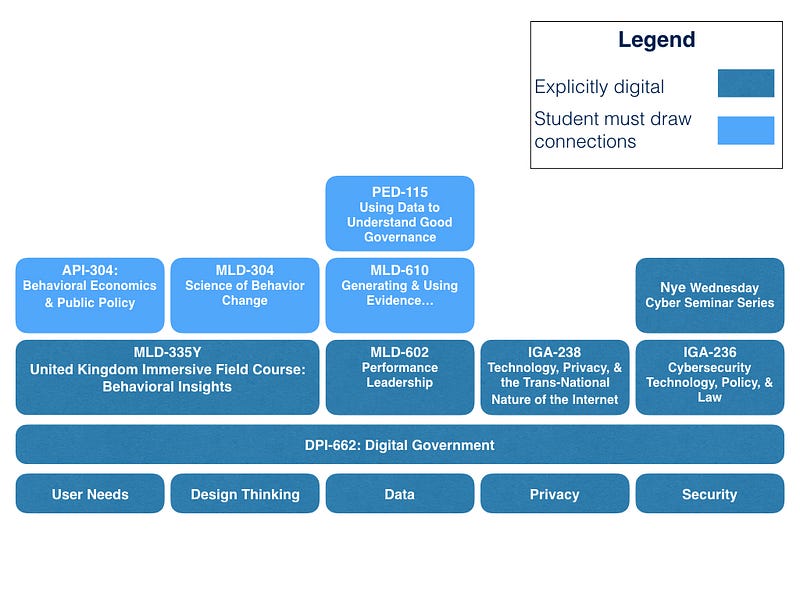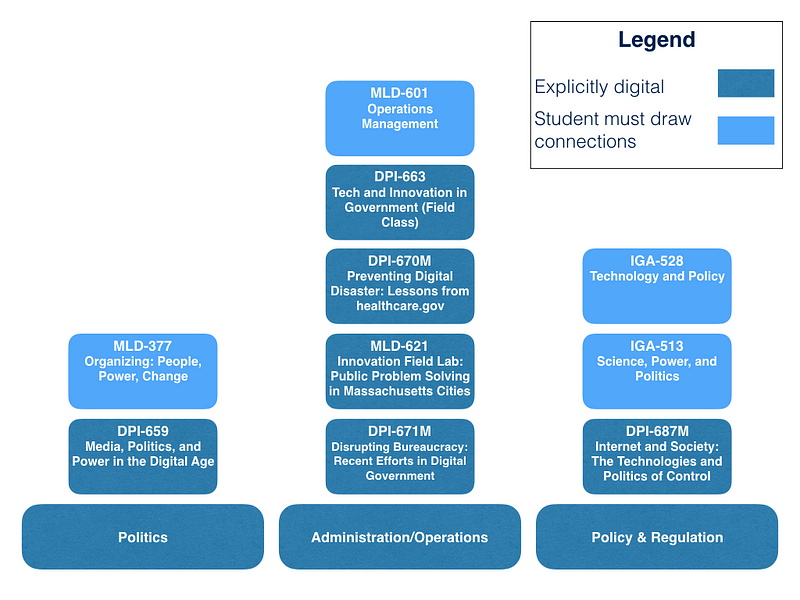Since arriving as a Lecturer at the Kennedy School of Government at Harvard, I’ve been thinking a lot about how to integrate digital into the curriculum. I have a course on Digital Government and will be teaching modules next term on what we’ve learned from Digital Services (like USDS and GDS) as well as one dissecting why Healthcare.gov failed and what we learned.
However, many students ask me what else they should be taking. And while I have broader thoughts on what policy schools and schools of government should be doing (more on that in another piece), carving out a digitally oriented curriculum based on assets the school already has is both a good exercise and can provide some instant advice to interested students. And the good news is, there more that touches digital at the Kennedy School than people realize — it just isn’t always framed that way.
So, for students looking at this space there are two ways I would look for courses.
The first is to identify courses that zero in on some areas of knowledge that are core to understanding digital. I’ve identified 5 that I think every school should focus on (and would love feedback on these): User Needs, Design Thinking, Data, Privacy and Security (and yes, privacy and security are separated for good reason!). I have more thoughts on why I’ve chosen these 5, but will save that for another piece so we can stay focused.
Having a grounding in each of these topics is critical. They touch pretty much every other topic, concept and idea in the digital space. I cover each of these in my DPI-662 to provide students with such a grounding, but ideally there are (or should be) more courses that would allow students to delve even deeper into them.
With that in mind, the chart below outlines some courses I know, or suspect, would accomplish this goal. The dark blue courses are explicitly about digital/technology in government, while the light blue ones cover relevant subject matter, but may require the student to make linkages to the digital (perhaps by choosing their assignments or the cases they focus on strategically).

The second way to identify courses is by the type of job or role you hope to pursue after graduation. Here, broadly see three types of career paths:
- Politics: For students who intend to be politicians, or a staffer
- Administration/Operations: For students who intend to run large organizations or oversee the delivery of services
- Policy and Regulation: For students who want to write and/or advocate policy
Again, a basic grounding in the five disciplines outlined previously is an essential prerequisite. This is because this second batch of courses draws on all 5 in varying degrees. The courses may emphasize some — like say security or data — more than others, but having a grounding all five will both make these courses more enjoyable and enable students to learn more from them.

A few additional thoughts:
- I’m still relatively new and so not intimately familiar with all the courses at HKS, so would love feedback if anyone thinks these are wrong or am missing some
- I’ve limited myself to courses at HKS. I’m confident there are courses elsewhere on campus that could be helpful. Will start to look at those next
- Would love feedback and thoughts on anything in the piece. It forms part of a much broader piece I’m working on
- Part of the exercise here is to identify gaps where further courses could be helpful — so would also love thoughts on that
- There are lots of non-courses (e.g. reading groups, projects at the Ash, Belfer or Shorenstein Centers that touch on this material — I’ve not included those here
- Finally, would like to thank Glynis Startz — second year student here at HKS — for helping me sort through the catalogue
Pingback: Time for a Data Dewey Decimal? | Kate O'gorman